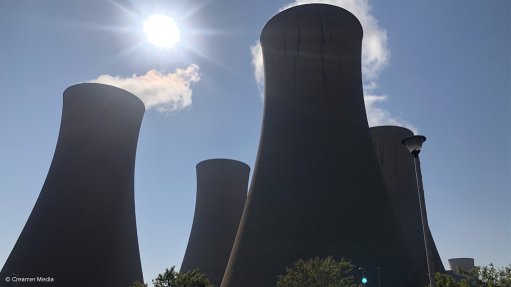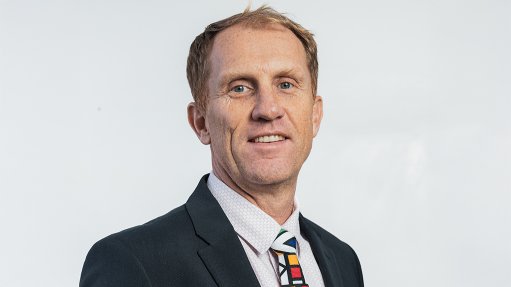Gas-powered electricity generation not South Africa’s best bet for the long term –WWF
The attractiveness of renewable energy, even in the face of using gas as a bridging fuel to take off from where coal is being disused, is continuing to increase, the World Wide Fund for Nature senior climate specialist James Reeler has said.
During a webinar titled ‘Fossil gas: decarbonisation solution, detour or dead end?’, on December 2, he said Bid Window 5 of the Renewable Energy Independent Power Producer Programme had shown that the price of renewables was lower than what was previously forecast to occur only in 2050.
“This rate of reduction is still continuing. Similarly for wind, Bid Windows 1 to 4 saw a rapid reduction in price and, for Bid Window 5, we have half-a-rand per kilowatt-hour [as an] average cost. The lowest cost was 34c/kWh,” said Reeler.
Nonetheless, he noted that peaking power generation capacity was still required in some form or another – an option for which Eskom currently dispatches its open cycle gas turbines (OCGTs), which are diesel fired.
OCGTs can be fired with gas, providing a less emissions-intensive solution, he noted.
In this regard, Reeler said that, although gas-fired OCGTs provided a good application in terms of meeting short peak generation periods, issues around investing into such plants arose because of how costs could fluctuate and increase over the build period, as well as be affected by global gas price volatility.
Alternatively, using a battery storage solution as a peaking plant would mean such a peaking plant’s prices were easier to factor in because prices for battery solutions have not been volatile and are in fact rapidly reducing.
He added that supply chain constraints could impact battery solution prices in the next year, but that the long-term trend was “very clear” about a downward price trend.
“So, for peaking, already we are close to price parity and, with other options long term, we can see that increasing.”
Further, a lot of South Africa’s gas is currently imported through Mozambique – South Africa’s key option for the medium term.
Reeler noted that for South African-produced gas, the gas plays around Mossel Bay had largely not played out, and that the only real option was the Brulpadda and Luiperd gas discoveries, the former being South Africa’s largest deposit.
Also, South Africa had various undiscovered gasfields, which mostly comprised shale gas, which Reeler said were uneconomic.
Nonetheless, as the industry currently stood, he said, the timelines for gas development were likely to materialise from the Virginia and Luiperd deposits in 2022 to 2026.
Realistically, Reeler added that Brulpadda would only come online from 2031, depending on approval of the Upstream Petroleum Act and other issues in the international arena.
“This is exactly the same time where we are starting to see the necessity globally to start to decrease our gas and emissions. Bringing [gas projects] online at that point, when we have already had a further ten years of additional storage development and we have a strong global push [for renewables] is potentially risky in terms of our investments,” he said.
STORAGE
“What do we use for storage when we have [for instance] a week of reduced wind availability or solar availability or part of the grid being damaged? How do we address that need?,” asked Reeler.
In terms of meeting South Africa’s immediate deficit and peak demand needs, he said gas was a “good option” for the near term. “. . . but the gas itself can either be natural gas, or in the medium to longer term we can think about green hydrogen-power-to-liquids as we have a large renewable build-out.”
In the longer term, an array of energy and power storage options could be used, including gravity storage. “We are in negotiations with mining houses within South Africa to trial a gravity storage [process], effectively just lowering and raising heavy weights, which makes them rapidly dispatchable,” he said.
Article Enquiry
Email Article
Save Article
Feedback
To advertise email advertising@creamermedia.co.za or click here
Press Office
Announcements
What's On
Subscribe to improve your user experience...
Option 1 (equivalent of R125 a month):
Receive a weekly copy of Creamer Media's Engineering News & Mining Weekly magazine
(print copy for those in South Africa and e-magazine for those outside of South Africa)
Receive daily email newsletters
Access to full search results
Access archive of magazine back copies
Access to Projects in Progress
Access to ONE Research Report of your choice in PDF format
Option 2 (equivalent of R375 a month):
All benefits from Option 1
PLUS
Access to Creamer Media's Research Channel Africa for ALL Research Reports, in PDF format, on various industrial and mining sectors
including Electricity; Water; Energy Transition; Hydrogen; Roads, Rail and Ports; Coal; Gold; Platinum; Battery Metals; etc.
Already a subscriber?
Forgotten your password?
Receive weekly copy of Creamer Media's Engineering News & Mining Weekly magazine (print copy for those in South Africa and e-magazine for those outside of South Africa)
➕
Recieve daily email newsletters
➕
Access to full search results
➕
Access archive of magazine back copies
➕
Access to Projects in Progress
➕
Access to ONE Research Report of your choice in PDF format
RESEARCH CHANNEL AFRICA
R4500 (equivalent of R375 a month)
SUBSCRIBEAll benefits from Option 1
➕
Access to Creamer Media's Research Channel Africa for ALL Research Reports on various industrial and mining sectors, in PDF format, including on:
Electricity
➕
Water
➕
Energy Transition
➕
Hydrogen
➕
Roads, Rail and Ports
➕
Coal
➕
Gold
➕
Platinum
➕
Battery Metals
➕
etc.
Receive all benefits from Option 1 or Option 2 delivered to numerous people at your company
➕
Multiple User names and Passwords for simultaneous log-ins
➕
Intranet integration access to all in your organisation


















